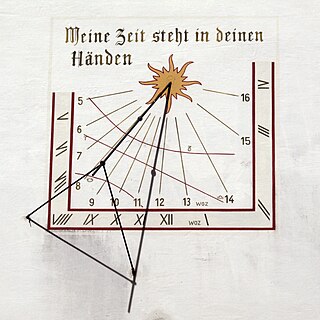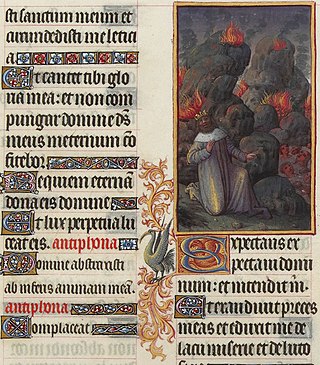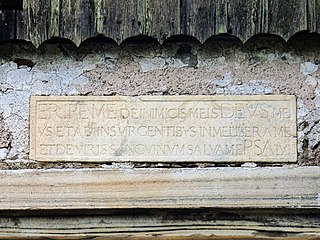Related Research Articles

The Epistle to the Romans is the sixth book in the New Testament, and the longest of the thirteen Pauline epistles. Biblical scholars agree that it was composed by Paul the Apostle to explain that salvation is offered through the gospel of Jesus Christ.

The Lord's Prayer, often known by its incipit Our Father, is a central Christian prayer that Jesus taught as the way to pray. Two versions of this prayer are recorded in the gospels: a longer form within the Sermon on the Mount in the Gospel of Matthew, and a shorter form in the Gospel of Luke when "one of his disciples said to him, 'Lord, teach us to pray, as John taught his disciples'". Regarding the presence of the two versions, some have suggested that both were original, the Matthean version spoken by Jesus early in his ministry in Galilee, and the Lucan version one year later, "very likely in Judea".
William Tyndale was an English biblical scholar and linguist who became a leading figure in the Protestant Reformation in the years leading up to his execution. He is well known as a translator of most of the Bible into English, and was influenced by the works of prominent Protestant Reformers such as Martin Luther.
The word anathema has two main meanings. One is to describe something or someone that is hated or avoided. The other is to refer to a formal excommunication by a Holy Catholic Church. These meanings come from the New Testament, where an anathema was a person or thing cursed or condemned by God. In the Old Testament, an anathema was something or someone dedicated to God as a sacrifice, or cursed and separated from God because of sin. These represent two types of setting apart, one for devotion, the other for destruction.
Thorn in the flesh is a phrase of New Testament origin used to describe an annoyance, or trouble in one's life, drawn from Paul the Apostle's use of the phrase in his Second Epistle to the Corinthians 12:7–9:
And lest I should be exalted above measure through the abundance of the revelations, there was given to me a thorn in the flesh, the messenger of Satan to buffet me, lest I should be exalted above measure. 8 For this thing I besought the Lord thrice, that it might depart from me. 9 And he said unto me, My grace is sufficient for thee: for my strength is made perfect in weakness. Most gladly therefore will I rather glory in my infirmities, that the power of Christ may rest upon me. (KJV)
Jah or Yah is a short form of the tetragrammaton יהוה (YHWH), the personal name of God: Yahweh, which the ancient Israelites used. The conventional Christian English pronunciation of Jah is, even though the letter J here transliterates the palatal approximant. The spelling Yah is designed to make the pronunciation explicit in an English-language context, especially for Christians who may not use Hebrew regularly during prayer and study.

The Douay–Rheims Bible, also known as the Douay–Rheims Version, Rheims–Douai Bible or Douai Bible, and abbreviated as D–R, DRB, and DRV, is a translation of the Bible from the Latin Vulgate into English made by members of the English College, Douai, in the service of the Catholic Church. The New Testament portion was published in Reims, France, in 1582, in one volume with extensive commentary and notes. The Old Testament portion was published in two volumes twenty-seven years later in 1609 and 1610 by the University of Douai. The first volume, covering Genesis to Job, was published in 1609; the second, covering the Book of Psalms to 2 Maccabees plus the three apocryphal books of the Vulgate appendix following the Old Testament, was published in 1610. Marginal notes took up the bulk of the volumes and offered insights on issues of translation, and on the Hebrew and Greek source texts of the Vulgate.

Psalm 109 is a psalm in the Book of Psalms, beginning in English in the King James Version: "Hold not thy peace, O God of my praise". In the slightly different numbering system used in the Greek Septuagint version of the Bible and in the Latin Vulgate, this psalm is Psalm 108. In Latin, it is known as "Deus, laudem". It is attributed to King David and noted for containing some of the most severe curses in the Bible, such as verses 12 and 13. It has traditionally been called the "Judas Psalm" or "Iscariot Psalm" for an interpretation relating verse 8 to Judas Iscariot's punishment as noted in the New Testament.

The Tyndale Bible (TYN) generally refers to the body of biblical translations by William Tyndale into Early Modern English, made c. 1522–1535. Tyndale's biblical text is credited with being the first Anglophone Biblical translation to work directly from Hebrew and Greek texts, although it relied heavily upon the Latin Vulgate and Luther's German New Testament. Furthermore, it was the first English biblical translation that was mass-produced as a result of new advances in the art of printing.

Psalm 83 is the 83rd psalm of the Book of Psalms, beginning in English in the King James Version: "Keep not thou silence, O God". In the slightly different numbering system used in the Greek Septuagint and Latin Vulgate translations of the Bible, this psalm is Psalm 82. In Latin, it is known as "Deus quis similis erit tibi ne taceas". It is one of the 12 Psalms of Asaph. This psalm is the last of the Psalms of Asaph, which include Psalms 50 and 73 to 83. It is also the last of the "Elohist" collection, Psalms 42–83, in which the one of God's titles, Elohim, is mainly used. It is generally seen as a national lament provoked by the threat of an invasion of Israel by its neighbors.

Psalm 42 is the 42nd psalm of the Book of Psalms, often known in English by its incipit, "As the hart panteth after the water brooks". The Book of Psalms is part of the third section of the Hebrew Bible, and a book of the Christian Old Testament. In the Hebrew Bible, Psalm 42 opens the second of the five books (divisions) of Psalms, also known as the "Elohistic Psalter" because the word YHWH is rarely used and God is generally referred to as "Elohim".

Psalm 31 is the 31st psalm of the Book of Psalms, beginning in English in the King James Version: "In thee, O LORD, do I put my trust". In Latin, it is known as "In te Domine speravi". The Book of Psalms is part of the third section of the Hebrew Bible, and a book of the Christian Old Testament. In the slightly different numbering system used in the Greek Septuagint version of the Bible, and in its Latin translation, the Vulgate, this psalm is Psalm 30. The first verse in the Hebrew text indicates that it was composed by David.

Psalm 40 is the 40th psalm of the Book of Psalms, beginning in English in the King James Version: "I waited patiently for the LORD". The Book of Psalms is part of the third section of the Hebrew Bible, and a book of the Christian Old Testament. In the slightly different numbering system used in the Greek Septuagint and Latin Vulgate translations of the Bible, this psalm is Psalm 39. In Latin, it is known by the incipit, "Expectans expectavi Dominum". It is described by the Jerusalem Bible as a "song of praise and prayer for help".

Psalm 54 is the 54th psalm of the Book of Psalms, beginning in English in the King James Version: "Save me, O God, by thy name, and judge me by thy strength". In the slightly different numbering system used in the Greek Septuagint and Latin Vulgate translations of the Bible, this psalm is Psalm 53. In Latin, it is known as "Deus in nomine tuo salvum me fac", Attributed to David, it was written for one who finds oneself betrayed by a friend.

Psalm 59 is the 59th psalm of the Book of Psalms, beginning in English in the King James Version: "Be merciful unto me, O God, be merciful unto me". In the slightly different numbering system of the Greek Septuagint version of the Bible and the Latin Vulgate, this psalm is Psalm 56. In Latin, it is known as "Eripe me de inimicis meis Deu". It is described as "a prayer composed when Saul sent messengers to wait at the house in order to kill him", and commentator Cyril Rodd describes it as a "vigorous plea for the destruction of the psalmist's enemies".

Psalm 62 is the 62nd psalm of the Book of Psalms, beginning in English in the King James Version: "Truly my soul waiteth upon God: from him cometh my salvation". The Book of Psalms is part of the third section of the Hebrew Bible, and a book of the Christian Old Testament. In the slightly different numbering system used in the Greek Septuagint version of the Bible and in the Latin Vulgate, this psalm is Psalm 61. In Latin, it is known as "Nonne Deo subiecta erit anima mea". The psalm offers a warning not to let one's power erode one's trust in God.

Psalm 66 is the 66th psalm of the Book of Psalms, beginning in English in the King James Version: "Make a joyful noise unto God, all ye lands". In the slightly different numbering system of the Greek Septuagint version of the Bible and the Latin Vulgate, this psalm is Psalm 65. In Latin, it is known as "Iubilate Deo omnis terra". It is a psalm of thanksgiving probably intended for use at the Passover. The psalm is divided into two parts: in verses 1-12 the community praises God and invites the whole world to join in praise; in verses 13–20, "an individual from the rescued community fulfils a vow to offer a sacrifice of thanksgiving".

Psalm 71 is the 71st psalm of the Book of Psalms, beginning in English in the King James Version: "In thee, O LORD, do I put my trust: let me never be put to confusion". It has no title in the Hebrew version. In the slightly different numbering system used in the Greek Septuagint and Latin Vulgate translations of the Bible, this psalm is Psalm 70. In Latin, it is known as "In te Domine speravi".

Psalm 81 is the 81st psalm of the Book of Psalms, beginning in English in the King James Version: "Sing aloud unto God our strength". In the slightly different numbering system used in the Greek Septuagint and Latin Vulgate translations of the Bible, this psalm is Psalm 80. In Latin, it is known as "Exultate deo adiutori nostro". It is one of the 12 Psalms of Asaph. Its themes relate to celebration and repentance. In the New King James Version its sub-title is "An Appeal for Israel's Repentance".
The Obedience of a Christen man, and how Christen rulers ought to govern, wherein also thou shalt find eyes to perceive the crafty convience of all iugglers. is a 1528 book by the English Protestant author William Tyndale. The spelling of this title is now commonly modernized and abbreviated to The Obedience of a Christian Man. It was first published by Merten de Keyser in Antwerp, and is best known for advocating Caesaropapism: the ideology that the King of a country was the head of that country's church, rather than the Holy See, and to be the first instance, in the English language at any rate, of advocating the divine right of kings, a concept mistakenly attributed to the Catholic Church.
References
- ↑ "powers that be". The Free Dictionary. Farlex. 2011. Retrieved June 5, 2016.
- ↑ Tyndale, William (1526). Tyndale Bible. Archived from the original on September 27, 2013.
- ↑ Archived December 18, 2014, at the Wayback Machine
- ↑ "The powers that be - meaning and origin". Phrases.org.uk. Retrieved June 2, 2015.
- ↑ "powers that be - definition of powers that be by The Free Dictionary". Thefreedictionary.com. March 1, 1987. Retrieved June 2, 2015.
- ↑ Biblos.com. Chain Link Bible. Romans 13:1.
- ↑ Watrous, Peter (April 22, 1990). "RECORDINGS; Public Enemy Makes Waves - and Compelling Music". The New York Times . New York. Retrieved June 7, 2012.
- ↑ "Puscifer Lyrics".